Globalization and God – Part I
Globalization and God – Part I
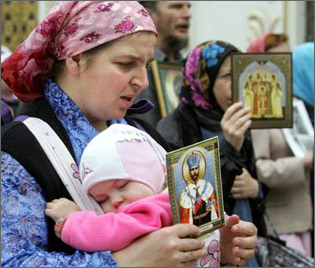
NEW DELHI: Relations between the Islamic World and the West were already tense before the Pope’s lecture at Regensburg University lent grist to the mill of those who believe that a clash of civilizations is all but inevitable. Turkey, already wary of the Pope’s claim that Europe must acknowledge and protect its essentially Christian identity, is embittered further. Assorted protests continue across the Muslim world.
Critiques of the Pope’s theological and historical judgments abound, but do not address questions raised by this episode. Does globalization require an ethic of religious exchange? Should there be a set of norms, unstated conventions, restraints that govern religious exchange? What makes the challenge of a religious exchange particularly acute is the fact that reported acts of terrorist violence are, in the public mind, associated with one religious group: Islam. A religion already on the defensive, seeing itself under a state of siege, is doubly sensitive to any portrayals of the religion. But this heightened sensitivity, paradoxically, only reinforces stereotypes of Islam, thus creating a vicious cycle.
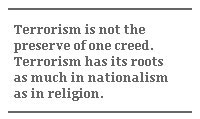
One response to this vicious cycle is to be more honest about the complex roots of political violence in the modern world. Terrorism is not the preserve of one creed; it has its roots as much in nationalism as in religion. Terrorist violence should not exempt state-sponsored forms of violence, like the war on terror, from scrutiny. This is not to excuse terrorism, but to create a space where discussions of violence are not seen as a pretext for targeting Islam. Opening this space is an uphill battle at both ends: the papal indiscretion and President Bush’s remarks on Islamic fascism remind how quickly we can descend into a discourse of religious conflict. Meanwhile, the Muslim world in West Asia does not have a leadership capable of breaking the stereotypes being imposed upon them.
Heightened religious sensitivities dot the global landscape. They raise profound questions for an ethic of religious exchange. Hindus protested when textbooks in California suggested that Hinduism was associated with caste oppression. The film, “The Da Vinci Code,” led to demonstrations in many parts of the world. Muslim groups often protest how their religion is represented. Religious groups constantly protest how they are represented by others. The protests have an underlying assumption: that there is a correct way to represent a religion’s historical tenets and doctrines. The test of this correct way is that the representation should not offend or impugn the adherents of the group being represented.
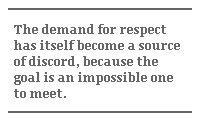
Even those who are non-members of any religion whose adherents feel hurt by particular representations implicitly agree with this demand. The idea that we should respect all religions and be mindful of the sentiments of believers seems like a good counsel of prudence. It might even teach us to value a diverse range of resources upon which members of different cultures and faiths draw to understand the world and give their lives meaning. Misrepresenting a religion both insults adherents and turns a blind eye to immense cultural achievement.
The call for respecting all religions seems as plausible a candidate for an ethic of global religious exchange as any. And on the face of it, it seems reasonable. Global politics would be healthier if different groups were mindful of one another’s sensitivities. But, paradoxically, the demand for respect has itself become a source of discord, because it is an impossible one to meet.
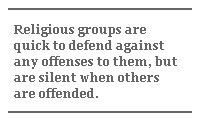
Religions must recognize four facts: As glorious as religious heritages might be, most organized religion comes with unsavory baggage. All kinds of oppression and violence have been licensed in their name. We can debate whether this constitutes the essence of a particular religion. But it is near impossible to debate historical religions without representing any in a way that does not offend some of its adherents. These representations should not be malicious or undertaken with impunity, but will be discomforting nonetheless.
Second, despite calls for respect, the blunt truth is that almost no religion can, from within its own theological premises, grant parity to other religions in some deep and meaningful sense. In this way, religious speech intrinsically creates hierarchies of one kind or the other.
Third, belief is not a matter of will. We cannot oblige other people to think about history or theology in a particular manner. All we can hope is that their conclusions about religion are made in good faith, not a product of willful misinterpretation. But the line between good-faith inquiry and demeaning conclusions is very thin in the eyes of most adherents.
Finally, the form that the demand for respect takes is inherently competitive in two ways. First, it constantly escalates. We have gone from a state where outrage used to be expressed against grossly malicious representations, to a state where ordinary historical discussion can occasion outrage. Religious groups are quick to defend against any offense, but are silent when others are offended. Muslim groups rarely protest appalling representations of the West or of Jews. Hindu groups, normally quick on the take when the Pope is deemed to offend their co-religionists, remained silent on the Pope’s remarks on Islam. In short, the politics of respect is not a universal ethic. It is instead a competitive game where different religious groups show how much power they have by demanding respect.
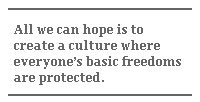
It appears that the prospects of a global ethic of religious exchange are at an impasse. The demand that any mention of religion requires an expression of respect is an impossible task. It has generated a competitive politics of seeking respect. The second option is a kind of global pact, where mere mention of other religions is seen as, at the every least, lacking in tact. Such forbearance would impose its own costs on freedom and will be impossible to sustain. The third option in global religious exchange is some form of inter-religious dialogue. While such a dialogue can obviate gross misunderstandings, it is too much to hope that it will allow serious differences to be overcome.
The only solution is to shift the ground of the debate from religion. We cannot have a global discussion expunged of all references that religious groups may find discomforting; nor can we oblige people to think and speak of other religions in particular ways. All we can hope is to create a culture where everyone’s basic freedoms are protected. A culture of rights is a more honest response than the demand for respect. But this culture of rights has two requirements: Religious differences will have to be detached from political fault lines. But most importantly, religious groups must overcome their sense of fragility, and have more confidence in managing constructions others place on them. A culture of religious exchange can be sustained only when adherents of religions begin to trust that “Our God can defend himself better than we can.”
Pratap Bhanu Mehta is president of the Center for Policy Research in Delhi, India.